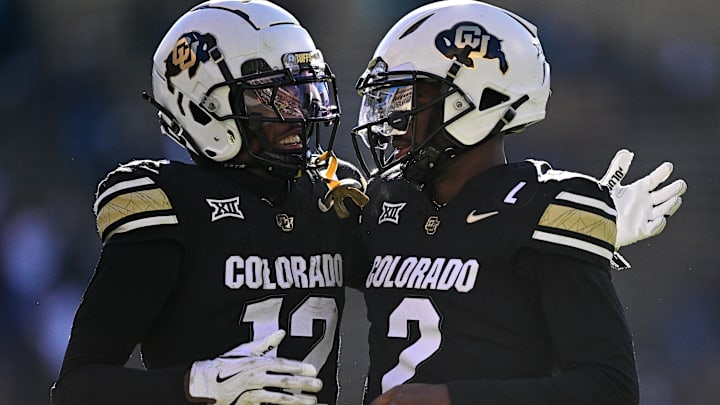Colorado has announced that during its annual spring game on April 19, the program will retire the jersey numbers of Shedeur Sanders (No. 2) and Travis Hunter (No. 12) just months after the two played their final college snaps in Boulder. That’s right—“Officially Untouchable,” as Colorado put it.
If you’ve followed college football over the past two seasons, there’s no denying what these two accomplished. After a dismal 1-11 campaign in 2022, Deion Sanders came in, brought in his son Shedeur Sanders and superstar Travis Hunter, and completely flipped the narrative. By 2024, the Buffs had a 9-4 record and were just a tiebreaker away from playing in the Big 12 Championship Game.
Shedeur lit up the stat sheet with over 4,100 passing yards and 37 touchdowns. And Hunter? He became the first true two-way star we’ve seen in decades, catching 96 passes for 1,258 yards and 15 touchdowns while also recording 23 tackles and 3 interceptions at cornerback—on his way to winning the Heisman Trophy. That's insane.
But retiring their jersey numbers already? It might be a little premature.
Why It Was Probably Unnecessary for Colorado to Retire Their Jerseys
Let’s be clear: this isn’t a knock on either player. I’ve got nothing but respect for what Shedeur Sanders and Travis Hunter did on the field. Shedeur did things most quarterbacks simply can’t do—often while running for his life behind a shaky offensive line. And Hunter? His two-way dominance and ability to change the game on both sides of the ball put him in rarefied air. He’ll go down as one of the most talented players in college football history. That’s not up for debate.
But jersey retirements? Those are sacred territory. At most programs, that honor is reserved for legends who not only produced jaw-dropping stats but also achieved greatness over a sustained period—or brought home national championships. For Colorado, that bar has traditionally been set pretty high.
Just look at Rashaan Salaam. He won the Heisman Trophy in 1994, led Colorado to an 11-1 season, and still had to wait 23 years before having his No. 19 jersey retired—an honor that came after his tragic death in 2016. Salaam is Colorado’s only Heisman winner and the school's lone College Football Hall of Fame inductee. If that’s the gold standard, it makes this latest move feel a little… rushed.
And sure, you can argue that Shedeur and Hunter helped put Colorado football back on the map. But the Buffs still finished 9-4 last season. They didn’t win a conference title. They didn’t make the expanded College Football Playoff. And they lost the Alamo Bowl. By all means, they had an impressive turnaround—but it wasn't the kind of season that typically triggers jersey retirement talks.
It’s not like Colorado doesn’t have history either. The program has a national championship (1990), multiple top-10 finishes, and a legacy of NFL talent. Those accomplishments aren’t ancient history either. This isn’t a program grasping for the first good thing that’s happened in decades.
So why the rush?
You could chalk it up to the Deion Sanders effect. Coach Prime has completely reshaped how Colorado markets itself. He’s brought national relevance and media attention back to Boulder. Retiring the jerseys of his son and his biggest star during the spring game is another big-time branding move. And no doubt—it’ll get attention.
But when you jump the gun like this, you risk cheapening what a jersey retirement actually means. If the bar is set at one great season and a viral following, where do you go from here? What happens if a future player wins a national title or becomes a top NFL pick after four years of carrying the program? What’s left to honor them with?
That’s not to say Shedeur and Travis don’t deserve to be celebrated—they do. Statues? But to already retire their numbers before the next wave of stars even hits campus? It feels more like a marketing decision than a moment of legacy.
There’s always room to retire their jerseys down the road, especially once we see how their contributions age in the larger context of Colorado football. But doing it now—so soon after their departure—feels reactionary. It’s not about whether they will deserve it someday. It’s about whether this is the right moment. And if you ask most longtime college football fans, the answer is probably no.
